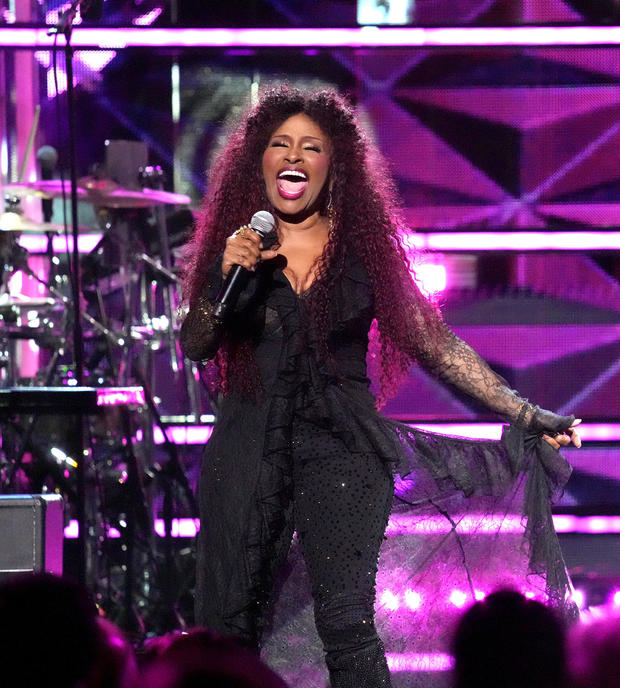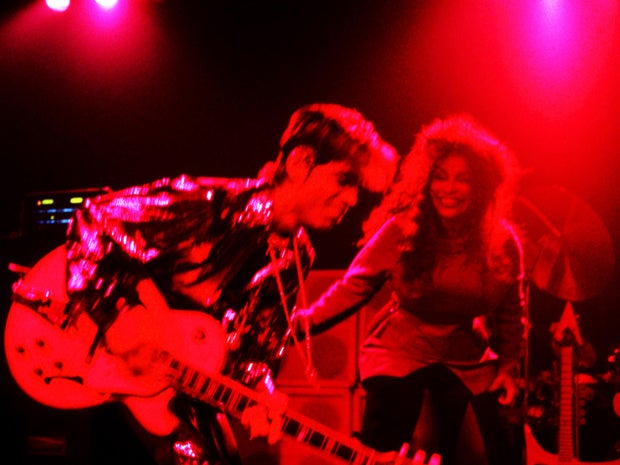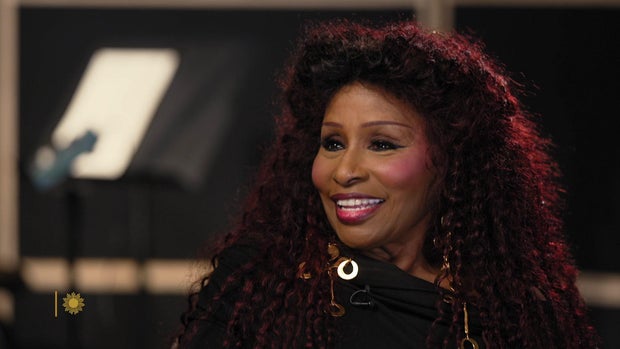
It was 1984, and the name Chaka Khan was on repeat all over the world.
“I Feel For You,” written by Prince, and featuring the rapper Melle Mel, shot up the charts. Everyone loved that intro – except maybe Khan herself. “I was embarrassed,” she said. “I didn’t like anybody saying my name over. I said, ‘I gotta live with this.'”
Sanneh asked, “Did you know that that intro was gonna be so iconic?”
“Yes, I knew that was gonna be kiss of death for me!” Khan laughed.
Earlier this month, at the Barclays Center in Brooklyn, Chaka Khan was inducted into the Rock & Roll Hall of Fame. She performed at the ceremony with friends like Sia, H.E.R., and Common, though she’s not eager to embark on a new tour.
Sanneh asked, “Are you able now to sort of take a breath and really enjoy the fact that so many people want to celebrate what you’ve done?”
“How ’bout, I can now sit back, and look at some good movies, and spend some time with my grandchildren, plant some flowers and s**t?” she replied.
Jeff Kravitz/FilmMagic via Getty Images
At age 70, she’s certainly earned some time off. She built her legacy with a string of monster hits, starting in the 1970s – classics like “Sweet Thing,” “Ain’t Nobody,” and “Tell Me Something Good,” written by Stevie Wonder.
“There’s this famous story where he comes in and he says, ‘I’ve got a song that you guys might like,'” Sanneh said. “And he plays it, and you famously say …”
“‘What else have you got?'” she laughed. “Yeah. It’s only fair!”
Turns out he did have something else: a new song which became “Tell Me Something Good.” Half a century later she’s still singing it. “I’ll still be singing this friggin’ frack song,” she laughed.
She was born Yvette Marie Stevens in Chicago. At 13, a Yoruba priest gave her an African name. “My name was Chaka Adunne Aduffe Yumuya Hodarhi Karifi. Khan came from my first husband from India,” she said.
“Well, it goes together well,” said Sanneh.
“It does. It works better than Yvette Stevens!”
Newly named for a warrior, Khan joined the Black Panther Party after becoming friends with Fred Hampton, one of its leaders. When asked what was inspiring about the movement, she replied, “That it was correct, that it was honest, and they were telling some truths.”
At one point, after an altercation with the police, she found herself in possession of a police officer’s gun. “Uh-huh. And I made a decision. Took me a second, yeah. I threw it in Botany’s Pond in Hyde Park!”
She decided to focus on music, singing with the funk band Rufus, and then on her own. Her first solo album, from 1978, included a song that became an anthem: “I’m Every Woman.”
Sanneh said, “It was you really telling people, ‘This is who I am.'”
“Yeah, that was the message in the song.”
By the ’80s Chaka Khan was a household name, and after the success of “I Feel For You,” she grew close with the guy who wrote it, Prince. “We both read the same stuff, and we talked a lot of philosophy. And then we decided we wanted to work together.”
In 1998, he helped write and produce her album, “Come 2 My House.” “We did that whole CD in two weeks’ time. I’d give him the lyrics. And he’d come back the next night to the track. Unbelievable.”
“Had you ever worked like that before?”
“Never. That was some kind of genius,” she said.
In 2016, Prince died at his home in Minnesota of an accidental drug overdose.
Sanneh asked, “Did you know that Prince was struggling toward the end of his life?”
“No, I did not. I knew that he had some breaks – his hip, and his ankles, and all that stuff. But, I mean, you know, at one point in my life I was an avid druggie myself. You’d think I could recognize that. But I just didn’t. He was a very giving, loving, open, yet private person. And I just had no clue.”
Bob Berg/Getty Images
Chaka Khan’s own struggle with drug addiction lasted decades. She wrote in her 2003 memoir “Chaka! Through the Fire,” “Whenever I started feeling stuff that I didn’t want to feel, I got high.”
“That was one of the reasons I got high,” she laughed. “I enjoyed it as well, at some point, to some extent. You know, it was part of my life experience.”
“And yet, at the same time, you were so productive, making so much music, so much great music?” asked Sanneh.
“Yeah. It was cuckoo!” she laughed. “How did I have two kids?”
“When you look back, is there anything you regret from the many decades of your career?”
“Nothing,” she replied. “Nothing.”
CBS News
Today, her songs are inspiring a new generation of listeners and performers. After a car crash in 2002, Kanye West sampled a sped-up recording of Chaka Khan’s song “Through the Fire,” calling his version, “Through the Wire.” It was the single that launched his career.
“That was a very meaningful song,” Khan said. “He called me, and he still had his mouth wired. And after he told me about the horrific accident and all that, I said, ‘Well, of course. I’d be happy to be a part of that.'”
Sanneh asked, “Is continuing new generations discovering your music and hearing it in a different way, is that something that you care about?”
“Absolutely,” she replied. “That’s my legacy! That’s why I’m here!”
For more info:
Story produced by Mary Raffalli. Editor: Lauren Barnello.


